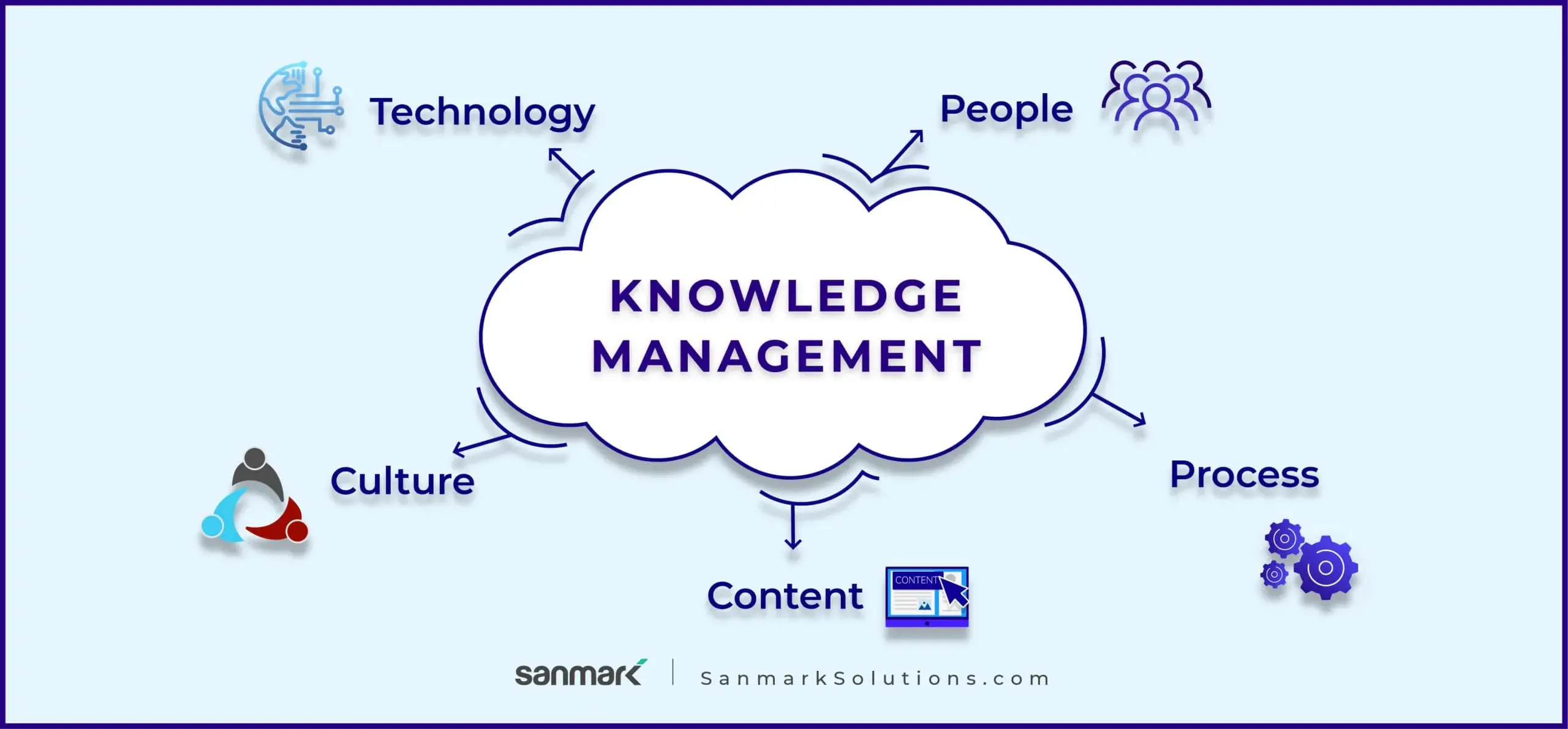Your company’s most valuable resource is the collective knowledge of its employees. And one of the essential requirements for success is the efficient management of such an asset. However, business executives frequently ignore the significance of knowledge management. It’s unfortunate because knowledge management in businesses has several beneficial advantages.
What is Knowledge Management?
The process of gathering, storing, sharing, and efficiently managing employee knowledge and experience to improve the general knowledge of the workforce is known as “Knowledge Management” (KM). Companies may gather, organise, and use this knowledge to their fullest advantage with the help of knowledge management. Its main objective is to increase productivity, efficiency, and internal information retention.
The main components of Knowledge Management are:
- People
- Process
- Content
- Culture
- Technology
What Factors Affect KM?
The effectiveness of knowledge management is influenced by a wide range of factors. They primarily consist of corporate culture, technology, appraisal and management of knowledge management resources and activities, leadership, employee motivation, and external factors. But these variables can be broadly divided into three categories: management influences, resource variables, and environmental variables.
-
Management Influences
The management of knowledge is the result of administrative considerations. Knowledge management is greatly influenced by knowledge development. These are divided into three categories: coordination, control, and leadership.
Coordination involves deciding which knowledge activities to carry out and in what order, and which people and knowledge resources each activity will use. Control refers to ensuring the necessary knowledge resources and processes are available in sufficient quality and quantity. The validity and utility of knowledge are two factors that management must consider.
The final component is leadership. A favourable environment for effective knowledge management is created when leadership is in line with the objectives and strategies of the organisation.
-
Resource Influences
The number of financial resources available for a learning activity may impact the operation’s effectiveness and the standard of its outcomes. Human resources also influence knowledge management, which allows or prevents managerial influences. Finally, organisational knowledge resources significantly impact knowledge management, including artefacts, culture, strategy, and participant knowledge. They also serve as the foundation for knowledge-based activities.
-
Environmental Influences
These are outside variables that affect the organisation. What information resources need or can be acquired during knowledge management depends on the external business environment. Competition, technological, economic, political, social, and educational issues are a few examples of environmental effects on knowledge management. However, the confluence of environmental factors may present chances to enhance knowledge management within the company.
Advantages of Knowledge Management

https://www.freepik.com/free-vector/_1086862.htm
Implementing an efficient knowledge management strategy can significantly affect enterprises and organisations of all sizes.
These advantages consist of:
- Quicker access to relevant information and data
- Increased effectiveness
- Reduced cost of operation
- Stops you from making the same mistakes again
- Improved decision-making
- Quicker problem-solving
- Enhanced innovation
- Enhanced business procedures due to improved communication
And the list goes on.
Strategies You Can Use to Develop Knowledge Management
A knowledge management strategy describes how your business will handle information, data, and knowledge to increase production and efficiency. Successful KM strategies keep your KM team focused on your business targets and needs while tightly aligned with departmental and corporate goals.
An efficient knowledge management strategy ought to:
- Support the overall objectives of the organisation.
- Balance processes, people, and technology.
- Enhance your organisation’s capacity to act quickly.
- Promote teamwork by utilising standard procedures and technology.
The five steps listed below should be followed when creating your knowledge management strategy:
-
Knowledge Audit
To develop a successful KM program in your firm, you must first evaluate the current KM capabilities of your company. Take into account the information your team needs daily and any informational silos that get in the way. Also, consider the procedures your firm employs and any inefficiencies or gaps in them.
Your company’s technology is a crucial component of a content knowledge audit. It’s critical to comprehend all of the present systems used by your company and their capabilities, users, limitations, and lifecycle status. You can analyse potential obstacles and successfully negotiate them if you know all the elements that go into a knowledge audit. -
Examine Business Value and Rank Opportunities
Identify the advantages that an effective KM strategy could have for your company based on the results of your knowledge audit. Next, organise the steps that will deliver that value.
-
Establish a Framework for Knowledge Management
KM frameworks are developed to assist in planning, designing, optimising, and scaling corporate knowledge for effective information sharing. It outlines the procedure by which all of the information now in use by your business will be compiled. Before developing your framework, you must choose which information is made public, how it is recorded, and how it will be accessed.
-
Define your KM Strategy
Indicate how you intend to integrate KM with your company’s overarching objectives and strategy. Describe how improving the flow of knowledge within your organisation will add value. Establish precise objectives and goals that everyone in your organisation can understand.
-
Create a Roadmap for Implementing Your Knowledge Management Strategy
Are you prepared to begin? Determining your KM priorities and how they relate to the larger business initiatives is crucial. Determine how you will measure the success of key knowledge management projects and adequately convey them. Create and provide a roadmap and implementation plan to develop capabilities that support knowledge generation, sharing, and flow.
Sanmark can help you strengthen your knowledge management approach.
An effective knowledge management (KM) strategy strongly relates to your company’s goals. It explains how your business will handle its data and information so everyone can access crucial information, make better choices, and increase productivity.
Sanmark is committed to levelling the playing field regarding knowledge management. It ensures your company has the opportunity to create practical KM plans, implement them, receive training, and receive support that will position you for success.
